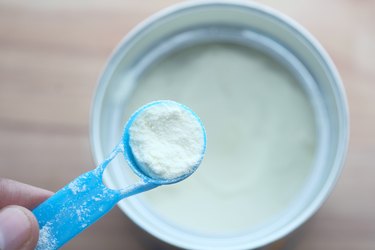
Powdered milk is an inexpensive, versatile and shelf-stable way to supplement your dairy intake. However, there are a couple of potential disadvantages of milk powder, including taste and texture that not everybody loves.
Pro: A Long Shelf Life
Video of the Day
One of the clearest advantages of powdered milk is its long shelf life. As the U.S. Dairy Export Council explains, the shelf life for an instant, nonfat dry milk powder is six to 12 months. For noninstant, nonfat dry milk powder, the expected shelf life is 12 to 18 months, although under ideal conditions the storage time can be extended to at least two years.
Video of the Day
The Dairy Export Council also notes that the conditions under which you store that milk powdercan make a big difference: Ideally, it should be stored at lower than 27 degrees Celsius (80 degrees Fahrenheit) and in relative humidity of less than 65 percent.
Once you've opened the package of dry milk, the PennState Extension recommends storing any leftovers in a tightly sealed container or bag in the refrigerator, where it'll keep for up to five days. Because your powdered milk has a much shorter storage life once the package is open, if you don't plan to use a lot of powdered milk at once it's best to buy it in smaller packages to minimize waste.
Read more: Drinking Milk Before Bed to Gain Weight
Pros: Cost-Effective and Versatile
Powdered milk's long storage life and versatility combine to make it a very cost-effective product. You can use it as a way to store milk in cabins or other off-grid properties; while camping; or simply as an inexpensive way to extend your milk supply at home or sneak extra calcium into your diet.
Powdered milk is also useful when space is at a premium — according to the American Dairy Products Institute, it only takes 3 cups of nonfat dairy milk powder to make 16 cups, or 1 gallon, of reconstituted skim milk.
But if you're a serious cook or baker, that's just the start of how powdered milk can be useful for you. The U.S. Dairy Export Council reels off an impressive list of powdered milk's uses, including improving the color of sauces, soups and baked goods; evening out flavor in a variety of foods; emulsifying fats; and improving the texture of a variety of sweet treats and prepared foods.
Read more: Milk or Water Protein Shakes
Tip
If you eat a typical 1,600- to 2,000-calorie diet, the U.S. Department of Health and Human Services recommends consuming the equivalent of about 3 cups of high-quality dairy products per day.
Cons: Taste, Texture ... and Cholesterol?
If you're dealing with picky eaters, taste and texture can be key disadvantages of milk powder. Some people say that even after it's been blended back in with water, they don't like the taste or texture of reconstituted milk powder. Saving fresh milk for drinking, and using your powdered milk in foods like cereal or recipes for soup and baked goods, is a good way to conceal any minor differences.
But one of the most commonly cited harmful effects of milk powder is the presence of oxidized cholesterol. However, there aren't any notable clinical studies that clearly identify how much of a health risk this is — or isn't. This is a subject of enough controversy that the National Dairy Council posted an article about oxidized cholesterol in powdered milk.
They explain that scientists have found that cholesterol oxidation can be minimized by using low processing temperatures (so look for low-heat powdered milk); using oxygen-proof packaging; and storing powdered milk in a cool, dry place. Discarding powdered milk that is past its expiration date will also minimize any oxidation of cholesterol in the product.
Finally, skipping whole powdered milk (the dehydrated version of full-cream milk) in favor of nonfat or low-fat powdered milk will greatly reduce your intake of saturated fat and cholesterol.
- U.S. Dairy Export Council: "Non-Fat Dry Milk and Skim Milk Powder"
- National Dairy Council: "Keeping It Fresh: Learning About Non-Fat Dry Milk"
- PennState Extension: "Nonfat Dry Milk - Is It on the Comeback?"
- American Dairy Products Institute: "Nonfat Dry Milk"
- U.S. Dairy Export Council: "Functional Properties"
- U.S. Department of Health and Human Services: "Dietary Guidelines for Americans, 2015-2020: Appendix 3. USDA Food Patterns: Healthy U.S.-Style Eating Pattern"